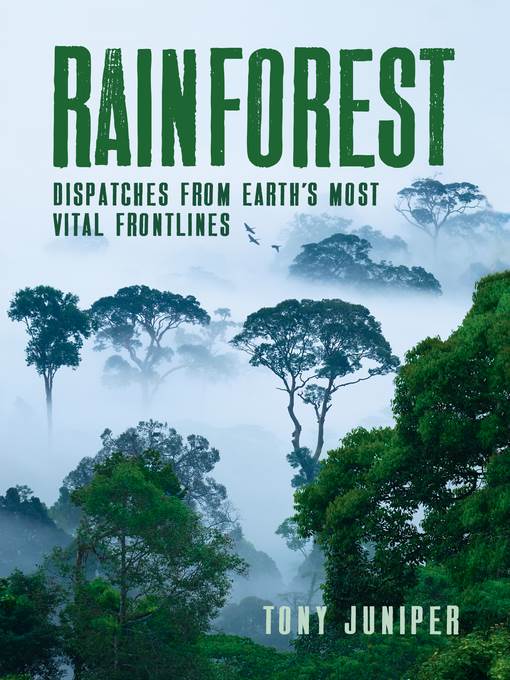
Rainforest
Dispatches from Earth's Most Vital Frontlines
کتاب های مرتبط
- اطلاعات
- نقد و بررسی
- دیدگاه کاربران
نقد و بررسی

June 15, 2019
A thoughtful exploration, scientific and political, of the ecological web from raindrop to global climatic system. The clue is right there in the name: What makes a rainforest tick is rain. However, the tropical rainforests that gird the equator do more than sit silently as the rain drips from leaf to ground. Instead, they play a central role in sequestering carbon dioxide and in regulating the world's climate, so that deforestation in the Amazon has second-order effects on rainfall in the American grain belt. Longtime Friends of the Earth organizer and rainforest campaigner Juniper (How We're F***ing Up Our Planet, 2018, etc.) examines "the diverse set of systems we call tropical rainforests," which mediate the flow of staggering amounts of water. Roughly one-fifth of all the water on the planet moves through the Amazon, for example, whose mouth is more than 200 miles wide, "greater than the distance between London and Paris." Essential to this movement, of course, is rain, and deforestation has markedly affected rainfall. Juniper looks closely at the various threats to the rainforest, whose decline, he notes, begins with logging, which, legal or not, is often done not just for timber harvesting, but also to clear ground for new housing and farmland. Consumers in developed nations drive destruction in developing regions, with incessant demands for beef, soybeans, palm oil, and other forest-unfriendly products. Juniper can become a touch mystical at times. Mostly, however, he writes with a lightly worn but deep understanding of ecology, conservation biology, and population dynamics. He lucidly explains such matters as how to enlist rural populations in sustaining rainforests, identifying a host of big-picture problems such as poverty and political corruption, and making a strong case for "the idea that in combating climate change there [is] no more effective step than halting deforestation." A sturdy primer for anyone interested in learning about tropical rainforests and why it's essential to keep them healthy.
COPYRIGHT(2019) Kirkus Reviews, ALL RIGHTS RESERVED.

August 2, 2019
Writer and environmentalist Juniper (Saving Planet Earth) presents a well-referenced, beautifully illustrated monograph on the world's rain forests, which contain the most diverse, rich flora and fauna of anywhere. Enhanced with 97 photographs, 36 in arresting color, and three detailed maps, the engaging, carefully researched text details related human history, colonial exploitation, current and historical conservation efforts, and the effects of logging and agricultural conglomerates, particularly with regard to palm oil extraction, cocoa, coffee, and rubber. Juniper offers a glimpse of what the future may hold, both the perils and promises. The splendid images showcase not only the forests and their incomparable scenic contexts but also the people involved, as well as specific animals and plants. Readers may be surprised to discover there are rain forests in the UK and much of the Pacific Northwest. The author writes convincingly of how these ecosystems affect global air quality and water resources. VERDICT A vital work for all interested in natural and human history, logging, agriculture, environmental politics, and geography.--Henry T. Armistead, formerly with Free Lib. of Philadelphia
Copyright 2019 Library Journal, LLC Used with permission.

August 1, 2019
Environmentalist Juniper has a decades-long history of work in forest conservation and currently serves as chair of Natural England, the country's official government conservation agency. He tackles the rain forest as a topic from multiple angles in this heavily researched, smartly written, and singularly important title. Moving beyond discussion of the Amazon region, home to planet's best-known rain forest, he shares the history of the term (it entered the mainstream with the 1952 publication of The Tropical Rain Forest, by P. W. Richards), touches on the accurate use of descriptors like green ocean and sky rivers, and takes readers around the world as he tracks the significance of rain forests on several continents. Most important, he explains the far-reaching effects of rain forests, explaining how they serve as freshwater systems, recycling rain in areas surprisingly distant from their own geography. Consider this: the Amazon system moves about one-fifth of all freshwater traveling in the Earth's rivers. This is science writing at its best, an immersive read with a powerful message about why what happens in one part of the world matters to all of us.(Reprinted with permission of Booklist, copyright 2019, American Library Association.)

























دیدگاه کاربران